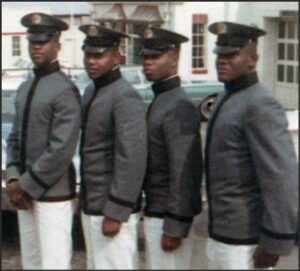
Letter from VMI Senior African American Alumni to the VMI Board of Visitors.
The numerous articles about the Virginia Military Institute, both from alumni and non-alumni, have been troubling to us as Senior African American Alumni (SAAA) [several members of the classes of ’72 to ‘76] of VMI. We have known the Institute to be a premier leadership institution and we have also experienced racial incidents. When wholly considered, VMI is an outstanding institution of higher-learning to which many of us owe a debt of gratitude.
This letter is in support of The Virginia Military Institute and Superintendent MG Cedric Wins, VMI Class of ‘85. As Senior African American Alumni, each of us has immensely benefited from the VMI experience. In 1968, VMI welcomed five African American young men to become part of the Corps of Cadets and to be the first black students. By all accounts, it was successful because VMI prepared for it to be successful. At the end of the previous academic year, the upcoming First-Class was challenged to lead the way for the integration of these “new” students into the Corps of Cadets. They were told, if these five black cadets failed, the First-Class would have failed to do its job.
It has been disappointing to hear that various alumni have downplayed that racial incidents happened. Even more, it has been disheartening to read how certain alumni have questioned the integrity of MG Wins and members of his administration, something unheard of until he was appointed Superintendent. As stated by a member of the SAAA, “for every one distasteful and belittling act that took place when I was there, I could count ten uplifting and enriching things. On the whole, VMI was life-enhancing for me and many others.”
In reference to the words and actions of some alumni, another member of the group said, “These behaviors are more heartbreaking than any damaging personal actions (unintentional or intentional) that I experienced while attending VMI.”
Throughout our cadetship, racial incidents were handled by the cadet leadership and the administration. During the ensuing years, those incidents did not fester to become a part of the policy or fabric of the school. It was a period of change for the Institute and VMI endured the changes for its betterment. Unfortunately, incidents have crept back into the environment that demand changes to bring us back to our true self.
With the many years of work experience after graduation and the opportunity to look back at benefits gained from the VMI experience, the Senior African American Alumni are fully supportive of our Institute, new leadership, Board of Visitors’ strategic guidance, and the necessary changes. MG Wins is a man of honor, of great character, an outstanding leader, and one who has a great love for the Institute. He has our full support. MG Wins is a prime example of the stellar leader that VMI produces. He is a leader who demonstrates the discipline to effectively listen, fairly analyze, collaboratively plan and implement the changes necessary to improve the principled-driven qualities of the VMI experience.
We, the Senior African American Alumni, wholeheartedly support the Institute, MG Cedric Wins, and MG Wins’ One Corps, One VMI plan which focuses on Honor, Diversity and Inclusion, The VMI Brand, Competing and Winning, and the concept of One VMI. The foundational strengths of VMI (the Honor System, Rat Line, and Military System) are not being changed. As stated in the Unifying Action Plan, the strength of VMI is in its diversity of experiences, thoughts, abilities, and backgrounds. By relying on each other, we all succeed.
The Institute must continue to strive to produce educated and honorable men and women equipped to be leaders in the 21st Century. We believe VMI, under the guidance of MG Wins is heading in the appropriate direction to achieve this goal. We ask the VMI Family to support the Superintendent and the administration, as well — One VMI!
Signed by:
Harry W. Gore ‘72
Adam L. Randolph ‘72
Richard E. Valentine ‘72
Philip L. Wilkerson, Jr. ‘72
Mac A. Bowman ‘73
Charles L. Tyler, Jr ‘74
Marvin L. Watts ‘74
Eugene Williams ‘74
Raleigh L. James, Jr. ‘75
Samuel F. Moultrie, Jr. ‘75
Ronald J. Norman ‘75
Frank P. Delaine ‘76
Ronnie Moore ‘76

Leave a Reply
You must be logged in to post a comment.